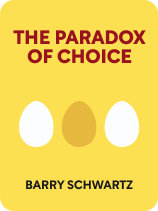

This article is an excerpt from the Shortform book guide to "The Paradox of Choice" by Barry Schwartz. Shortform has the world's best summaries and analyses of books you should be reading.
Like this article? Sign up for a free trial here .
Is Barry Schwartz’s book The Paradox of Choice worth reading? How was the book received when it came out? Did it make an impact?
In The Paradox of Choice, Barry Schwartz contends that the vast array of choices presented to us leaves us stressed and indecisive. To lift this burden, Schwartz, a professor of social theory and social action, recommends we learn how to better navigate our choices, from groceries to health insurance.
Here is our The Paradox of Choice book review.
About the Book
The Paradox of Choice, by psychology and economics researcher Barry Schwartz, argues that unrestrained choice in market democracies creates problems. Since the book’s publication in 2004, it’s generated ongoing debate.
Schwartz acknowledges that the freedom to choose is essential to our autonomy. However, he contends that the vast array of choices we have in contemporary Western societies leaves us stressed and indecisive. To lift this burden, Schwartz recommends we learn how to better navigate the choices we’re presented with, from groceries to health insurance.
About the Author
Schwartz is a professor of social theory and social action at Swarthmore College. His work combines psychology and economics and focuses on the problem of choice.
In addition to The Paradox of Choice, he has published seven other books and numerous articles for journals, magazines, and newspapers. Popular books by Schwartz include Why We Work, based on his TED Talk of the same name, which analyzes our motivations for working; and Practical Wisdom (co-written with Kenneth Sharpe), which describes the benefits of using what we’ve learned from personal experience, and applying it with intelligence and compassion.
Connect with Barry Schwartz:
The Book’s Publication
Publisher: Harper Perennial
Since the publication of The Paradox of Choice in 2004, Schwartz has continued to publish articles related to the proliferation of choice in market democracies, particularly the U.S., and how that can cause us unnecessary stress. HarperCollins e-books published a revised Kindle edition in 2009.
Historical Context
The expansion of choice in market democracies is an effect of the rise of consumerist capitalism, particularly in the United States. During the 20th century, the industrialized economy grew in fits and starts, hampered by significant national and global events (particularly World War I, the Great Depression, and World War II). However, following World War II, the organizations driving the economy placed their bets on the idea of consumerism.
At this point, the United States’ economy had grown large but needed to inspire consumer demand for the products it was generating at an accelerating rate. Companies used advertising and marketing to spark new needs and wants, thereby increasing consumer demand to match supply. Commodities came to be seen as status symbols: The middle class could now purchase “luxury” products, and these new goods communicated that their social station was on the rise. The United States’ economy, and those of comparable market democracies, continues to rely on consumerism. However, one result of a consumerist culture is that choices consistently expand. Since the economy relies on people constantly finding new things they want to buy, companies are incentivized to regularly create new options. As Schwartz argues, the expansion of choice now overwhelms our decision-making abilities and creates stress.
Intellectual Context
Much of The Paradox of Choice incorporates concepts from psychologists, economists, and social scientists. The ideas of psychologists Daniel Kahneman and Amos Tversky are particularly prominent throughout the book.
Kahneman is a Nobel Prize-winning economist and psychologist, whose work on decision-making and judgment significantly influenced Schwartz. In Thinking, Fast and Slow, Kahneman argues that our brains operate with two thinking systems: System 1, which runs on instinct, and System 2, which uses rational, deliberate thought.
Tversky worked with Kahneman to develop prospect theory, an economic framework for considering how we weigh alternatives involving risk and uncertainty. Kahneman’s work also incorporates cognitive biases, or psychological tendencies and logical fallacies that shape how we process events and make decisions.
The concepts of cognitive biases and prospect theory are central to Schwartz’s analysis of how we choose, and he connects these ideas to the problems of expanded choice.
The Book’s Impact
Schwartz’s ideas have been widely cited and debated since the book’s publication and reviews in major journalism outlets.
Schwartz gave a popular TED Talk where he summarized the book’s main ideas, and The New York Times, The New Yorker, and PBS NewsHour are just a few journalistic outlets that have published articles or aired segments on Schwartz’s ideas.
The Paradox of Choice book has also attracted criticism since its publication. For instance, writers in The Atlantic and the Financial Times questioned the premise of Schwartz’s book several years after its publication, when the problem of too much choice had become a mainstream idea.
According to these critics, Schwartz’s thesis was unscientific and not grounded in sufficient evidence; they argued that some of the key studies Schwartz used to shape his ideas were not consistently replicated. One primary argument against the paradox of choice is that, rather than being overwhelmed by numerous options, we’re unwilling to choose when we only have one option.
Schwartz responded to critics in detail. He acknowledged that his argument was not universal, and that there are instances when more choice can be beneficial. However, he maintained that excessive choice still frequently poses a problem, citing numerous other studies where this theory was borne out.
Schwartz’s overarching argument was that, while further research complicated his initial theory, the refinement and shifting of ideas is a key part of the scientific process, and he is open to changing his perceptions as new evidence emerges.
Critical Reception
The Paradox of Choice was reviewed positively by Publishers Weekly, which noted the book’s persuasive argument for its thesis and its accessibility to the average reader. Similarly, Booklist praised Schwartz’s book as insightful.
Online reader reviews have been mainly positive, nearly all agreeing with the central premise and many claiming the book opened their eyes to the difficulties of choice. Common criticisms are that the book is repetitive, that the examples are poorly chosen, and that Schwartz’s ideas are sometimes inadequately supported.
Commentary on the Book’s Approach and Organization
Schwartz gives a straightforward, easily comprehensible take on the topic. He states his main argument quickly and clearly and builds on the idea that the amount of choice in our society overwhelms us.
The Paradox of Choice is organized in four main sections: 1) “When We Choose,” 2) “How We Choose,” 3) “Why We Suffer,” 4) “What We Can Do.”
The first section delves into the choices people in contemporary market democracies make on a regular basis. The second section explores how we psychologically go about the decision-making process. The third section analyzes the pitfalls of making decisions, paying particular attention to how an excess of choices lessens our ability to effectively choose. The fourth section, which is the briefest, provides guidance for more effectively dealing with choice.

———End of Preview———
Like what you just read? Read the rest of the world's best book summary and analysis of Barry Schwartz's "The Paradox of Choice" at Shortform .
Here's what you'll find in our full The Paradox of Choice summary :
- Why the more choices we have, the more stressed and indecisive we feel
- How to better navigate our choices, from groceries to health insurance
- Whether it's better to seek the best or accept "good enough"






